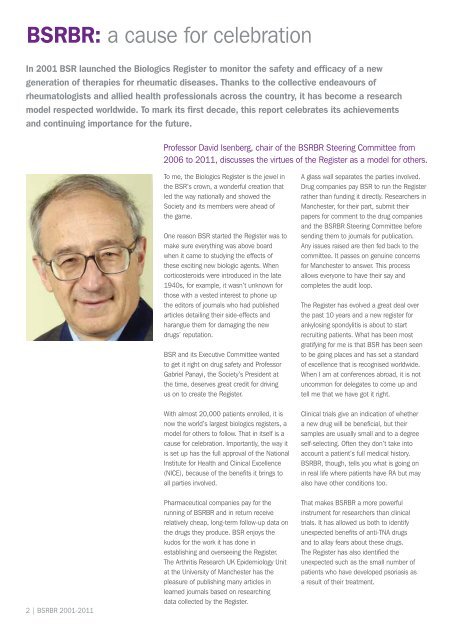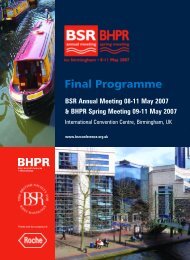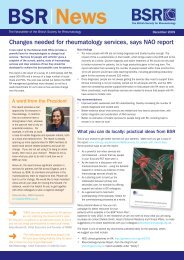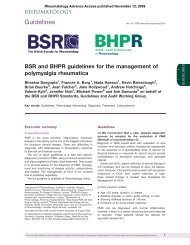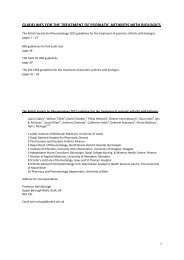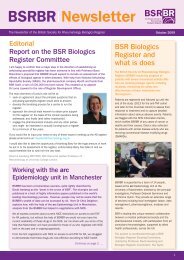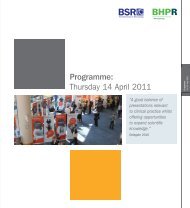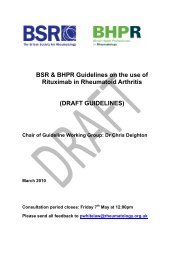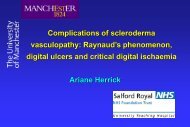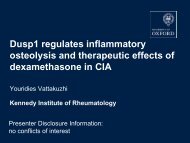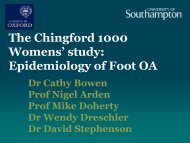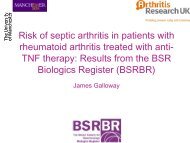BSRBR 10th Anniversary brochure - The British Society for ...
BSRBR 10th Anniversary brochure - The British Society for ...
BSRBR 10th Anniversary brochure - The British Society for ...
You also want an ePaper? Increase the reach of your titles
YUMPU automatically turns print PDFs into web optimized ePapers that Google loves.
<strong>BSRBR</strong>: a cause <strong>for</strong> celebration<br />
In 2001 BSR launched the Biologics Register to monitor the safety and efficacy of a new<br />
generation of therapies <strong>for</strong> rheumatic diseases. Thanks to the collective endeavours of<br />
rheumatologists and allied health professionals across the country, it has become a research<br />
model respected worldwide. To mark its first decade, this report celebrates its achievements<br />
and continuing importance <strong>for</strong> the future.<br />
Professor David Isenberg, chair of the <strong>BSRBR</strong> Steering Committee from<br />
2006 to 2011, discusses the virtues of the Register as a model <strong>for</strong> others.<br />
2 | <strong>BSRBR</strong> 2001-2011<br />
To me, the Biologics Register is the jewel in<br />
the BSR’s crown, a wonderful creation that<br />
led the way nationally and showed the<br />
<strong>Society</strong> and its members were ahead of<br />
the game.<br />
One reason BSR started the Register was to<br />
make sure everything was above board<br />
when it came to studying the effects of<br />
these exciting new biologic agents. When<br />
corticosteroids were introduced in the late<br />
1940s, <strong>for</strong> example, it wasn’t unknown <strong>for</strong><br />
those with a vested interest to phone up<br />
the editors of journals who had published<br />
articles detailing their side-effects and<br />
harangue them <strong>for</strong> damaging the new<br />
drugs’ reputation.<br />
BSR and its Executive Committee wanted<br />
to get it right on drug safety and Professor<br />
Gabriel Panayi, the <strong>Society</strong>’s President at<br />
the time, deserves great credit <strong>for</strong> driving<br />
us on to create the Register.<br />
With almost 20,000 patients enrolled, it is<br />
now the world’s largest biologics registers, a<br />
model <strong>for</strong> others to follow. That in itself is a<br />
cause <strong>for</strong> celebration. Importantly, the way it<br />
is set up has the full approval of the National<br />
Institute <strong>for</strong> Health and Clinical Excellence<br />
(NICE), because of the benefits it brings to<br />
all parties involved.<br />
Pharmaceutical companies pay <strong>for</strong> the<br />
running of <strong>BSRBR</strong> and in return receive<br />
relatively cheap, long-term follow-up data on<br />
the drugs they produce. BSR enjoys the<br />
kudos <strong>for</strong> the work it has done in<br />
establishing and overseeing the Register.<br />
<strong>The</strong> Arthritis Research UK Epidemiology Unit<br />
at the University of Manchester has the<br />
pleasure of publishing many articles in<br />
learned journals based on researching<br />
data collected by the Register.<br />
A glass wall separates the parties involved.<br />
Drug companies pay BSR to run the Register<br />
rather than funding it directly. Researchers in<br />
Manchester, <strong>for</strong> their part, submit their<br />
papers <strong>for</strong> comment to the drug companies<br />
and the <strong>BSRBR</strong> Steering Committee be<strong>for</strong>e<br />
sending them to journals <strong>for</strong> publication.<br />
Any issues raised are then fed back to the<br />
committee. It passes on genuine concerns<br />
<strong>for</strong> Manchester to answer. This process<br />
allows everyone to have their say and<br />
completes the audit loop.<br />
<strong>The</strong> Register has evolved a great deal over<br />
the past 10 years and a new register <strong>for</strong><br />
ankylosing spondylitis is about to start<br />
recruiting patients. What has been most<br />
gratifying <strong>for</strong> me is that BSR has been seen<br />
to be going places and has set a standard<br />
of excellence that is recognised worldwide.<br />
When I am at conferences abroad, it is not<br />
uncommon <strong>for</strong> delegates to come up and<br />
tell me that we have got it right.<br />
Clinical trials give an indication of whether<br />
a new drug will be beneficial, but their<br />
samples are usually small and to a degree<br />
self-selecting. Often they don’t take into<br />
account a patient’s full medical history.<br />
<strong>BSRBR</strong>, though, tells you what is going on<br />
in real life where patients have RA but may<br />
also have other conditions too.<br />
That makes <strong>BSRBR</strong> a more powerful<br />
instrument <strong>for</strong> researchers than clinical<br />
trials. It has allowed us both to identify<br />
unexpected benefits of anti-TNA drugs<br />
and to allay fears about these drugs.<br />
<strong>The</strong> Register has also identified the<br />
unexpected such as the small number of<br />
patients who have developed psoriasis as<br />
a result of their treatment.


